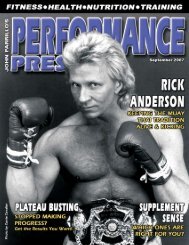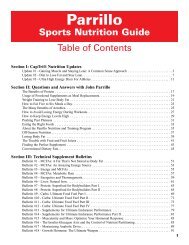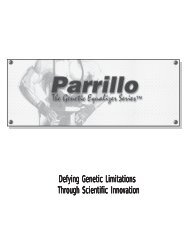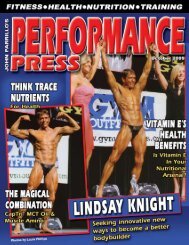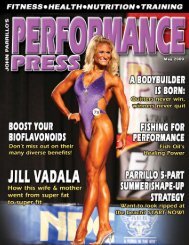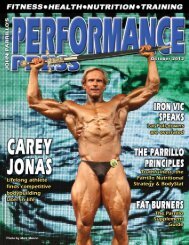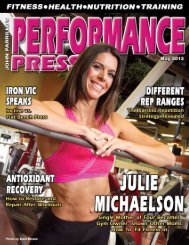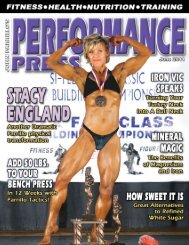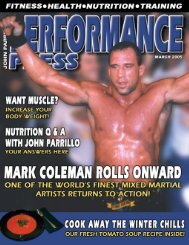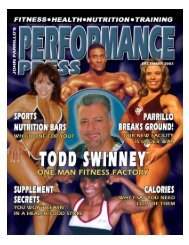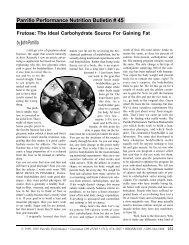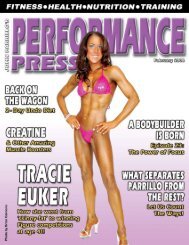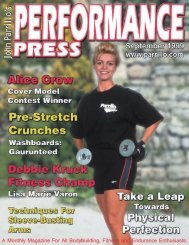John Parrillo'sJohn Parrillo's - Parrillo Performance
John Parrillo'sJohn Parrillo's - Parrillo Performance
John Parrillo'sJohn Parrillo's - Parrillo Performance
Create successful ePaper yourself
Turn your PDF publications into a flip-book with our unique Google optimized e-Paper software.
<strong>Parrillo</strong> Sports Nutrition Update<br />
Post Workout Nutrition<br />
by <strong>John</strong> <strong>Parrillo</strong><br />
Workout recovery is a very important<br />
issue for the serious athlete. There is<br />
some confusion about what is the best<br />
nutritional strategy to optimize recovery<br />
and growth after exercise. As is the<br />
case with many issues in nutrition, there<br />
is no single best answer. The best approach<br />
depends on what kind of athlete<br />
you are and what your goals are. There<br />
are some common questions we at <strong>Parrillo</strong><br />
<strong>Performance</strong> receive relating to the<br />
role of carbohydrates in the post-exercise<br />
environment. We are often asked:<br />
should my post-exercise meal include<br />
protein or carbohydrate? Or both? And<br />
just how much is enough? Is timing important?<br />
When is the best time to take<br />
Creatine? Optimal nutrition for a<br />
bodybuilder is different from that<br />
for an endurance athlete. Optimal<br />
nutrition varies individual to individual<br />
and circumstance to circumstance.<br />
Are you trying to optimize<br />
your physique, strength or endurance<br />
performance? Different goals<br />
require different methods. So<br />
when you hear conflicting opinions<br />
about the best diet or supplement,<br />
remember there is no single<br />
correct answer. We have to tailor<br />
the answer for each individual. I<br />
will share with you the principles<br />
that will allow you to customize<br />
your very own diet and nutritional<br />
supplementation program.<br />
For some background let’s rehash<br />
some biochemistry. During<br />
exercise your muscles use mainly<br />
carbohydrate and fat as fuel. Sometimes,<br />
during prolonged activity (like<br />
distance running) you will burn protein<br />
stores. Protein oxidation in exercise occurs<br />
after glycogen stores are significantly<br />
depleted. For high intensity activity<br />
such as weight lifting (as opposed<br />
to long duration exercise like aerobics),<br />
carbohydrate is the primary fuel. For<br />
endurance activities like jogging or cycling,<br />
a mixture of carbohydrate and fat<br />
is used. As the exercise proceeds,<br />
muscle and liver glycogen stores become<br />
progressively depleted. It would<br />
make sense to replace the depleted fuel<br />
in order to keep our work output high.<br />
Furthermore, if our goal is to gain muscle<br />
then we need to supply the raw materials<br />
to support growth. We can do both<br />
simultaneously.<br />
Insulin levels decrease markedly during<br />
exercise and this allows the release<br />
of fat from adipose cells. The goal of<br />
our post-exercise recovery meal is to replenish<br />
energy stores depleted during<br />
the just-completed session. Insulin<br />
plays a central role in nutrient storage,<br />
acting to transport carbohydrates and<br />
some amino acids from the bloodstream<br />
Good protein sources include egg<br />
whites, fish, chicken breasts and turkey<br />
breasts without the skin.<br />
to the individual cells. Insulin also stimulates<br />
the storage of carbohydrate as glycogen.<br />
Significantly, carbohydrate is a<br />
potent stimulus for insulin release while<br />
protein’s effect on insulin is far more<br />
subdued. Athletes have long practiced<br />
eating a high carbohydrate meal after<br />
exercise and this makes a lot of sense.<br />
A high carb post-workout feeding<br />
serves to increase insulin levels and replenish<br />
glycogen stores. And this is a<br />
good thing: by replenishing drained nutrients<br />
and dousing exhausted muscles<br />
with nourishing carbohydrates, we promote<br />
muscle healing and growth in the<br />
post-workout state.<br />
Should this post-workout feeding also<br />
contain protein? And exactly how much<br />
carbohydrate and protein is optimal?<br />
What type? Are simple sugars or refined<br />
carbohydrates better in the post-workout<br />
environment?<br />
I never recommend eating simple sugars<br />
or referred carbohydrates – post<br />
workout or any other time - for several<br />
reasons: simple sugars and refined carbohydrates<br />
are far more likely to be converted<br />
to fat than complex carbohydrates.<br />
It’s all a matter of chemistry. If<br />
the sugar enters your bloodstream<br />
faster than it can be stored as glycogen,<br />
the excess will be converted<br />
to fat by the liver. No doubt about<br />
it! Some endurance athletes replenish<br />
glycogen with simple sugars<br />
or refined carbohydrate but this<br />
strategy is bad news for bodybuilders.<br />
A serious bodybuilder wants<br />
to minimize fat accumulation and<br />
therefore simple sugars and refined<br />
carbohydrates have no place<br />
in the diet of a top bodybuilder -<br />
even after a workout.<br />
Every meal should supply a mixture<br />
of protein and carbohydrate,<br />
including the post-exercise meal.<br />
In addition to replenishing glycogen<br />
stores, the post-exercise meal<br />
serves to re-supply amino acids<br />
used to repair muscle tissue. Several<br />
medical studies have examined how<br />
the composition of the recovery meal<br />
affects hormone levels critical for muscle<br />
growth (1-3). I have reviewed some of<br />
these studies in detail in the August,<br />
1997 edition of the <strong>Parrillo</strong> <strong>Performance</strong><br />
Press: you can access this data through<br />
our online web-site at www.parrillo.com/<br />
press/970804.htm. A post-workout feeding<br />
of carbohydrate and protein is demonstrably<br />
more effective at increasing<br />
insulin and growth hormone levels than<br />
16 <strong>John</strong> <strong>Parrillo</strong>’s <strong>Performance</strong> Press • May 1999 Orderline: 1•800•344•3404



